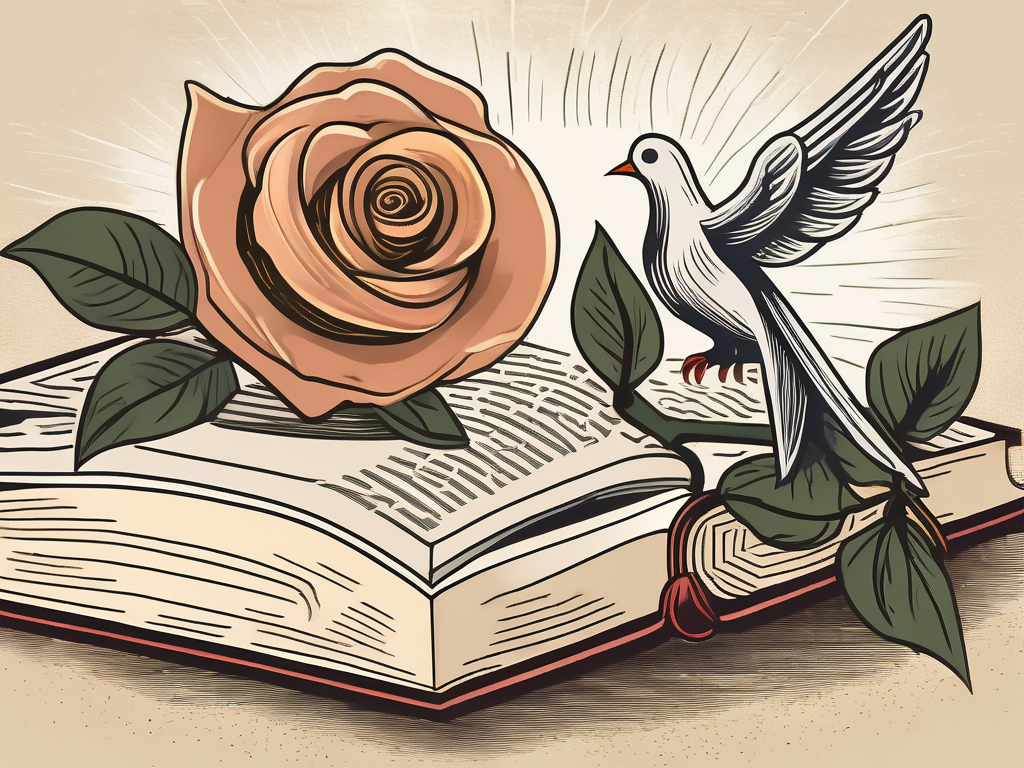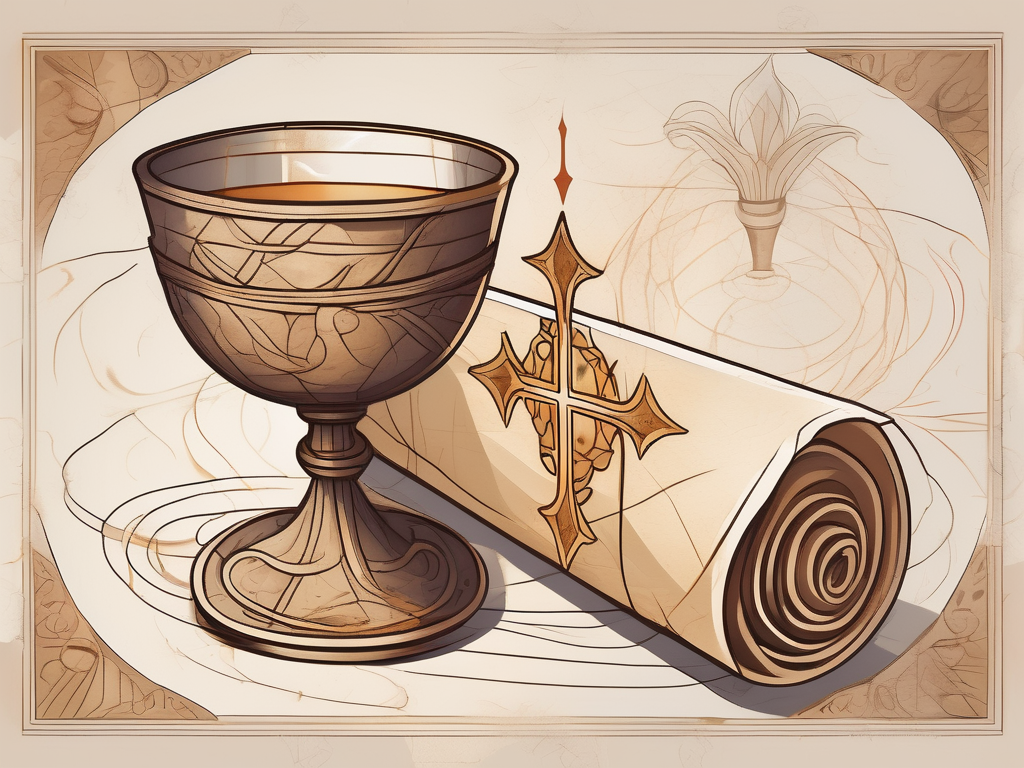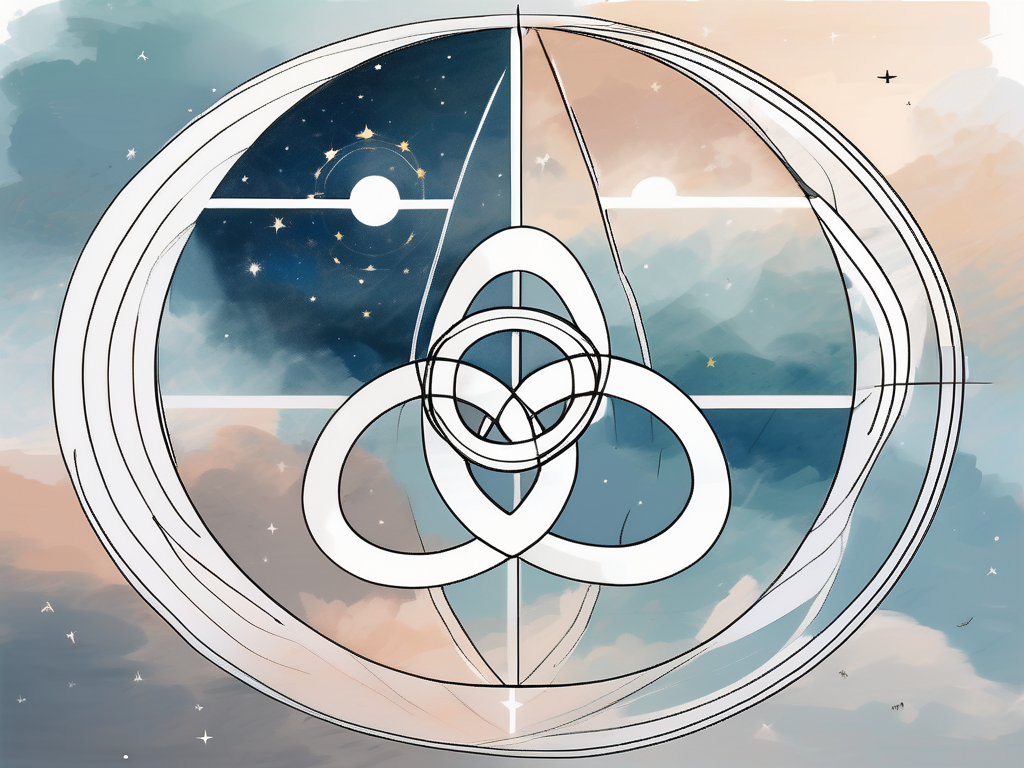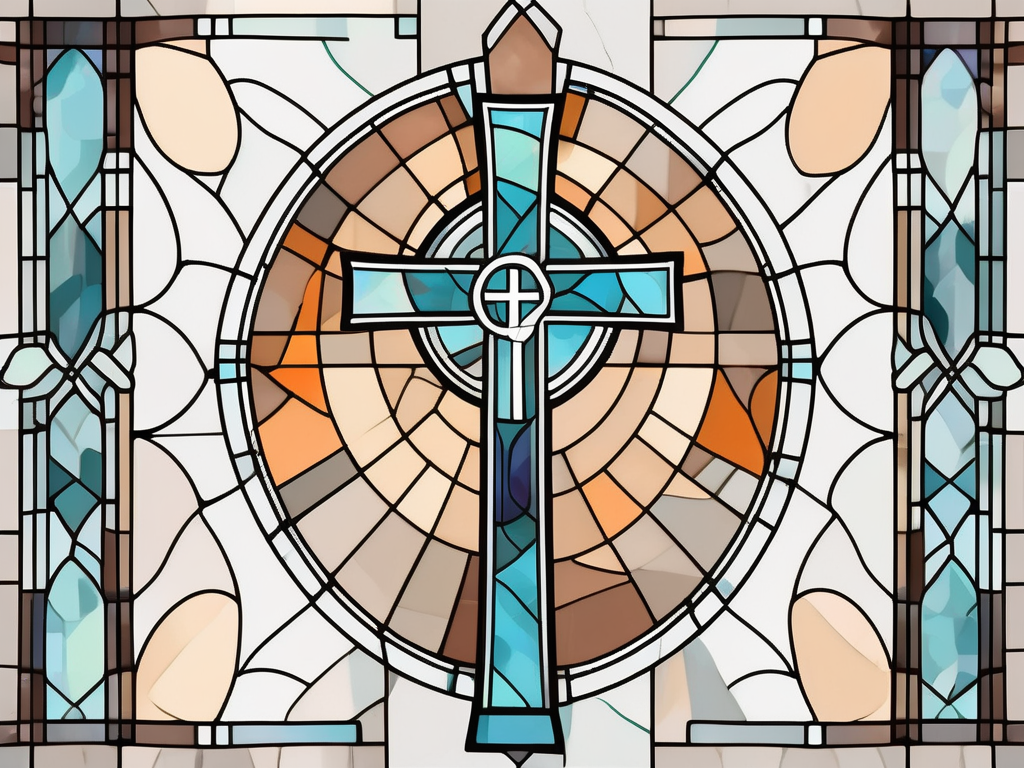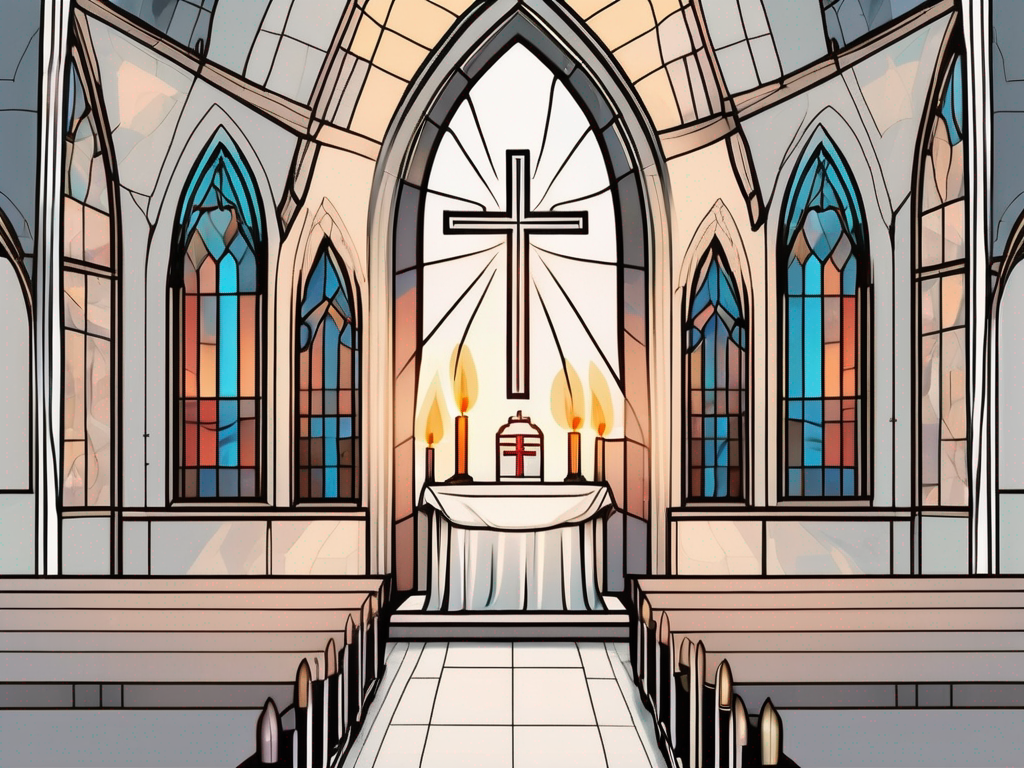Being one of the oldest and largest Christian denominations in the world, Catholicism has a rich history and a set of core beliefs that guide its followers. If you’re curious about what Catholics believe in, then keep on reading. In this article, we’ll discuss the foundations of Catholic faith, the importance of the Holy Scripture and tradition, the Catholic Church hierarchy, the role of saints and the Virgin Mary, and finally, Catholic rituals and practices.
The Foundations of Catholic Faith
At the core of Catholicism lies a belief in the Holy Trinity, which consists of God the Father, God the Son (Jesus Christ), and God the Holy Spirit. This belief is deeply rooted in the teachings of Jesus and the early Christian community. For Catholics, the Trinity represents the unity of three distinct persons in one divine being.
The Holy Trinity is a central mystery of the Catholic faith, and theologians have grappled with its understanding for centuries. It is believed that God the Father is the creator of the universe, the source of all life and love. God the Son, Jesus Christ, is seen as the incarnation of God, who took on human form to save humanity from sin. God the Holy Spirit is considered the presence of God in the world, guiding and inspiring believers.
Within the Trinity, there exists a perfect communion of love and relationship. Catholics believe that this divine love overflows into the world, inviting all people to participate in the life of God. This understanding of the Trinity shapes the way Catholics view themselves and their relationships with others, emphasizing the importance of love, unity, and community.
Another key aspect of Catholic belief is the sacraments. Catholics see the sacraments as channels of God’s grace, where they can experience a deeper connection with the divine. Baptism, the first sacrament, is seen as the gateway to the Christian life, where individuals are cleansed of original sin and initiated into the Church.
Holy Communion, also known as the Eucharist, holds a central place in Catholic worship. It is believed that during the Mass, the bread and wine become the body and blood of Jesus Christ, symbolizing his sacrifice on the cross and providing spiritual nourishment for believers. Through receiving the Eucharist, Catholics believe they are united with Christ and with one another.
Confirmation is another sacrament where individuals receive the gifts of the Holy Spirit and publicly affirm their faith. Reconciliation, also known as Confession, allows Catholics to seek forgiveness for their sins and experience God’s mercy and healing.
Anointing of the Sick is a sacrament that offers comfort and spiritual strength to those who are seriously ill or facing the end of their lives. Holy Orders is a sacrament through which men are ordained as deacons, priests, or bishops, to serve the Church and its people. Matrimony is a sacrament that unites a man and a woman in a lifelong commitment of love and fidelity.
The concept of original sin and salvation is also crucial in Catholic theology. Catholics believe that all humans are born with original sin inherited from Adam and Eve, but through the life, death, and resurrection of Jesus Christ, salvation is made possible. By accepting Jesus as their savior and following his teachings, Catholics believe that they can attain eternal life with God in heaven.
Salvation is not seen as a one-time event, but rather as an ongoing process of growing in holiness and deepening one’s relationship with God. Catholics strive to live a life of faith, hope, and love, seeking to imitate the example of Jesus Christ in their thoughts, words, and actions.
The Catholic Church, with its rich traditions and teachings, provides a framework for believers to encounter God and live out their faith in the world. It offers a sense of belonging and community, where individuals can find support, guidance, and spiritual nourishment.
Throughout history, the Catholic Church has played a significant role in shaping culture, art, education, and social justice. Its teachings on social issues such as poverty, human dignity, and the sanctity of life continue to influence believers to work for a more just and compassionate society.
In conclusion, the foundations of Catholic faith encompass the belief in the Holy Trinity, the significance of the sacraments, the understanding of original sin and salvation, and the call to live a life of faith and love. These core beliefs and practices provide a framework for Catholics to deepen their relationship with God and engage with the world around them.
The Importance of the Holy Scripture and Tradition
The Bible holds a central place in Catholicism. It is considered the inspired Word of God and an essential guide for faith and morals. Catholics study the Bible, pray with it, and use its teachings as a source of guidance and wisdom in their daily lives.
But what is it about the Bible that makes it so significant to Catholics? It is not just a book of stories or historical accounts; it is a living document that reveals the very heart and mind of God. Through its pages, Catholics encounter the divine presence and hear the voice of God speaking directly to them.
When Catholics read the Bible, they do so with a sense of reverence and awe. They understand that the words they are reading are not mere human words, but the inspired words of God Himself. It is through the Bible that Catholics come to know God more intimately and develop a deeper relationship with Him.
Alongside the Bible, the Catholic Church also emphasizes the importance of apostolic tradition. Apostolic tradition refers to the teachings, practices, and customs handed down by the apostles and the early Church. Catholics believe that both Scripture and tradition work together to form the deposit of faith, providing a solid foundation for the Church’s beliefs and practices.
Tradition, like Scripture, is not something static or outdated. It is a living and dynamic reality that continues to shape and guide the Church today. Through tradition, Catholics are connected to the rich heritage of the early Christians and the apostles themselves.
One of the ways tradition is manifested in the Catholic Church is through the celebration of the sacraments. These sacred rituals, such as baptism, confirmation, and the Eucharist, have been passed down from generation to generation and are considered essential for the spiritual growth and nourishment of Catholics.
Another aspect of tradition is the development of doctrine. Over the centuries, the Church has carefully reflected on the teachings of Scripture and the guidance of the Holy Spirit to deepen its understanding of the faith. This process of reflection and discernment has led to the formulation of dogmas and doctrines that help Catholics better comprehend the mysteries of God.
Furthermore, tradition is also expressed through the liturgy and the Church’s liturgical calendar. Catholics participate in the rich and symbolic rituals of the Mass, which have been handed down through the centuries. These rituals connect Catholics to the universal Church and unite them with believers from all times and places.
In summary, the importance of the Holy Scripture and tradition in Catholicism cannot be overstated. They are both essential components of the Catholic faith, working together to provide a solid foundation for belief and practice. Through the Bible and tradition, Catholics encounter the living God and are nourished in their spiritual journey.
The Catholic Church Hierarchy
At the head of the Catholic Church is the Pope, who is regarded as the successor of Saint Peter, to whom Jesus entrusted the leadership of his Church. The papacy holds a significant role in Catholicism, serving as both a symbol of unity and as the highest authority in matters of faith and morals.
The Pope, also known as the Bishop of Rome, resides in the Vatican City, a sovereign state within Rome. The papal office is not only a spiritual one but also carries immense political and diplomatic influence. Throughout history, the Pope has played a crucial role in shaping world events and has been a prominent figure in international relations.
As the spiritual leader of the Catholic Church, the Pope is responsible for guiding and shepherding the faithful worldwide. He exercises his authority through various means, including issuing papal encyclicals, which are letters addressed to the entire Church community, outlining important teachings and doctrines.
On a regional level, the Catholic Church is organized into dioceses, each overseen by a bishop. Bishops are seen as successors of the apostles and are responsible for shepherding the faithful within their respective regions. They are entrusted with the task of teaching, sanctifying, and governing the Church in their dioceses.
Within a diocese, the bishop is supported by a team of clergy, including priests and deacons. Priests, ordained through the sacrament of Holy Orders, act as spiritual guides and celebrate the sacraments on behalf of the Church. They play a vital role in the day-to-day pastoral care of the faithful, providing spiritual guidance, administering the sacraments, and leading worship services.
Deacons, the lowest rank of holy orders, assist in various ministries and acts of service within the Church. They are ordained to a ministry of charity and are often involved in social outreach programs, caring for the poor, visiting the sick, and assisting in the administration of parishes.
Throughout history, the Catholic Church hierarchy has played a central role in the lives of its followers. It provides a structure and organization that ensures the unity and continuity of the faith. The hierarchy serves as a visible sign of the Church’s mission to spread the Gospel and bring the love and mercy of Christ to all people.
The Role of Saints and the Virgin Mary in Catholicism
The Catholic Church holds a deep reverence for saints, who are viewed as holy men and women who have lived exemplary lives of faith and are now in the presence of God. Canonization is the process by which the Church recognizes individuals as saints, affirming their intercessory power and encouraging devotion to them.
Devotion to the Virgin Mary is also an essential aspect of Catholic faith. Mary, as the mother of Jesus, holds a special place in Catholic theology and is honored for her obedience and role in salvation history. Catholics believe that Mary can intercede for them and act as a motherly figure in their spiritual journey.
Throughout history, countless saints have emerged as beacons of inspiration and guidance for Catholics around the world. These saints, through their extraordinary lives and unwavering faith, have become role models for believers seeking a deeper connection with God. They serve as a reminder that holiness is attainable and that ordinary individuals can lead extraordinary lives of virtue.
One such saint is Saint Francis of Assisi, known for his love for nature and his dedication to serving the poor. Born into a wealthy family, Saint Francis renounced his material possessions and embraced a life of simplicity and humility. His devotion to God and his compassion for all living creatures earned him a place in the hearts of Catholics worldwide. Today, many Catholics turn to Saint Francis for guidance in living a life of selflessness and compassion.
Another notable saint is Saint Teresa of Calcutta, commonly known as Mother Teresa. Her unwavering commitment to serving the poorest of the poor in Kolkata, India, has made her an icon of selfless love and compassion. Mother Teresa’s tireless efforts to alleviate the suffering of the marginalized and forgotten have inspired countless individuals to dedicate their lives to serving others. Her example serves as a reminder that even the smallest acts of kindness can have a profound impact on the world.
In addition to individual saints, there are also patron saints associated with specific causes, professions, and locations. These patron saints are believed to have a special affinity for those who seek their intercession. For example, Saint Joseph is considered the patron saint of workers, Saint Christopher is the patron saint of travelers, and Saint Anthony of Padua is the patron saint of lost items. Catholics often turn to these patron saints for guidance and protection in their daily lives.
Turning to the Virgin Mary, Catholics hold a deep reverence for her as the Mother of God. Mary’s role in salvation history is seen as pivotal, as she willingly accepted the call to become the mother of Jesus, the Son of God. Her obedience and unwavering faith serve as an example for all believers.
One of the most significant Marian apparitions is Our Lady of Guadalupe. According to tradition, the Virgin Mary appeared to a peasant named Juan Diego in Mexico in 1531. She left her image on Juan Diego’s cloak, known as the tilma, which still exists today. The image of Our Lady of Guadalupe has become a powerful symbol of faith and unity for Catholics in Mexico and beyond. Pilgrims from all over the world visit the Basilica of Our Lady of Guadalupe in Mexico City to pay homage to the Virgin Mary and seek her intercession.
Devotion to the Virgin Mary is expressed through various prayers and devotional practices, such as the Rosary. The Rosary is a form of prayer that combines vocal and meditative elements, focusing on the life of Jesus and the mysteries of salvation. Catholics believe that by praying the Rosary, they can seek the intercession of Mary and draw closer to her son, Jesus.
In conclusion, saints and the Virgin Mary play integral roles in Catholicism, providing believers with examples of holiness and intercession. Through their lives and devotion, they inspire Catholics to deepen their faith and seek a closer relationship with God. The rich history and diverse array of saints and Marian apparitions continue to captivate the hearts and minds of Catholics worldwide, reminding them of the power of faith and the importance of seeking the intercession of these holy figures.
Catholic Rituals and Practices
Central to Catholic worship is the celebration of the Mass. During the Mass, Catholics believe that the bread and wine become the body and blood of Jesus Christ through the process of transubstantiation. This sacred ritual serves as a commemoration of Christ’s sacrifice and a means of receiving his grace.
Additionally, prayer and fasting are significant practices in Catholicism. Catholics engage in personal and communal prayer, seeking guidance, expressing gratitude, and seeking intercession from saints. Fasting, particularly during the liturgical seasons of Lent and Advent, is seen as a way to grow in self-discipline, focus on spiritual matters, and unite with the suffering of Christ.
Understanding the core beliefs of Catholics provides insight into the profound spiritual and theological aspects of the faith. From the foundations of Catholicism to the importance of Scripture and tradition, the Church’s hierarchical structure, devotion to saints and the Virgin Mary, and various rituals and practices, Catholicism offers a rich tapestry of beliefs and traditions. Whether you are a Catholic yourself or simply curious about different religions, exploring these core beliefs can deepen your understanding of the Catholic faith.


